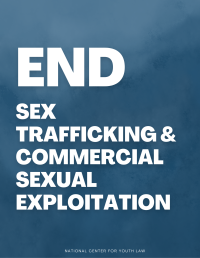NCYL Leads Development Of New Law Allowing Courts To Consider Survivors’ Trauma
NCYL developed a new California law in partnership with a coalition of individuals and organizations that supports survivors of violence, including human trafficking, intimate partner violence, and sexual violence, by allowing the criminal justice system to consider the full context of a person’s circumstances and experiences throughout the court process.
Assembly Bill 124, signed by California Gov. Gavin Newsom in 2021, expands affirmative defense, allows for trauma-informed plea negotiations, sentencing and re-sentencing relief, and post-conviction relief through vacatur. It works to address the gaps and failures of the current legal system by allowing the court to consider a survivor's experiences, age, and history of trauma at multiple points throughout the process. .
Why is this needed?
Prior to AB 124, California’s legal framework lacked a clear mechanism to ensure judges had information about a survivor’s experience of trauma, intimate partner violence, sexual violence, or human trafficking throughout the court process including during plea negotionas and at sentencingand re-sentencing.
According to the ACLU, nearly 60% of female state prisoners in the U.S., and as many as 94% of certain female prison populations, experienced physical or sexual abuse before being incarcerated. Black women make up a quarter of the incarcerated population in California, yet are only 5% of the adult population, demonstrating a fatal overrepresentation of Black women inside. Similar disparities exist for other individuals of color, including Latine and Native communities. Trans and non-binary survivors are also vastly overrepresented in prisons.
Survivors are often convicted of crimes and sentenced without the criminal legal system considering the trauma that took place before the individual was arrested. AB 124 will create more just outcomes for survivors by ensuring that the full context of their experiences are considered, resulting in a more humanizing and trauma-informed response to criminal adjudication.
What changes does AB 124 make?
AB 124 makes the following changes to California law:
- Affirmative Defense: Extends the existing affirmative defense statute, which previously only applied to human trafficking survivors, to include survivors of intimate partner violence and sexual violence;
- Plea Negotiations: During plea negotiations requires prosecutors to consider the impact of violence experienced by the survivor, the individual’s age, and whether the individual was a victim of intimate partner violence, sexual violence, or human trafficking;
- Sentencing: Creates a presumption that judges should start at the lower term when sentencing a survivor to prison if trauma, age, or victimization contributed to the commission of the offense;
- Re-Sentencing: Encourages judges to consider whether the survivor’s experience of trauma, intimate partner violence, sexual violence, or human trafficking when evaluating a survivor’s petition for re-sentencing; and
- Vacatur: Expands the vacatur law to allow survivors to petition the court to vacate convictions and expunge arrests for nonviolent offenses that were the direct result of victimization.
NCYL co-sponsored AB 124, authored by California Sen. Sydney Kamlager, alongside Black Futures Lab, Public Policy Institute, California Coalition of Women Prisoners (CCWP), Free to Thrive, Human Rights Watch, Survived and Punished, USC School of Law Post Conviction Clinic, The Women’s Foundation of California, Solis Policy Institute, and Young Women’s Freedom Center (YWFC). This coalition represents a broad group of stakeholders that are direct service providers, individuals who were formerly incarcerated, survivors of exploitation, and experts in pertinent areas of law.






